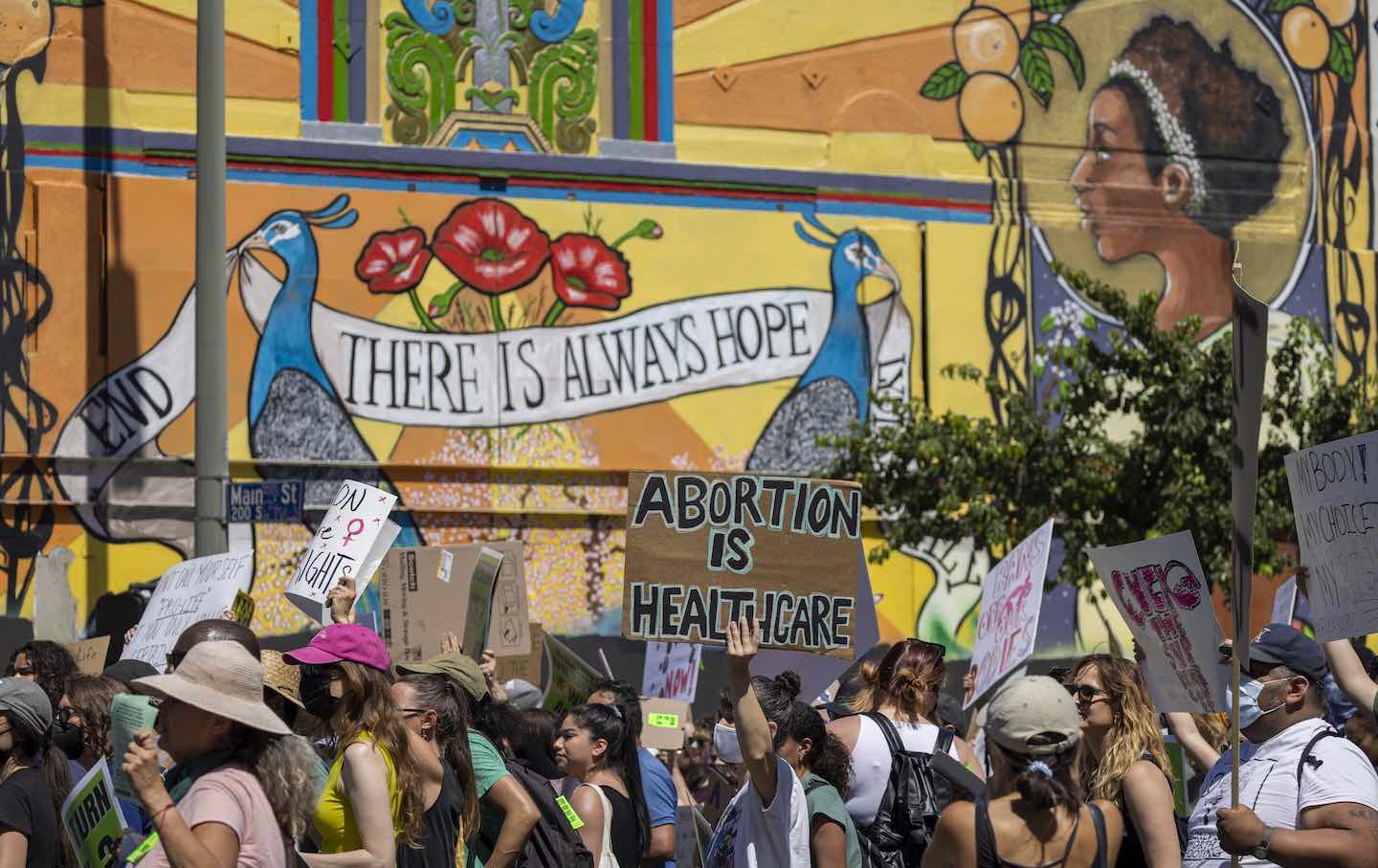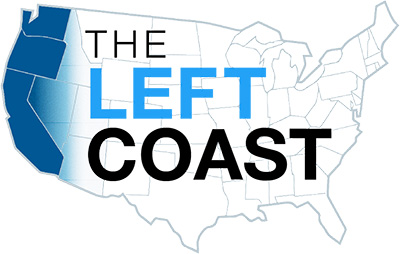
On June 26, 2022, in Los Angeles, Calif., protesters march to denounce the US Supreme Court decision to end abortion rights protections.(David McNew / Getty Images)

Last week’s devastating Supreme Court decision overturning Roe v. Wade—and the Biden administration’s depressingly tepid response to the emerging public health crisis that it has unleashed—has turbocharged state politics in the United States. If the federal courts won’t protect abortion access, and if the federal administration is too timid to use creative methods—opening up federal properties for performing abortions in states where the procedure is now banned by state law, attempting to expand the Supreme Court, or pushing the Senate to overturn the filibuster so as to be able to enact federal legislation protecting abortion rights—it’s all going to come down to the states.
During the Trump administration, California positioned itself as the center of resistance to Trump’s environmental and immigration policies. These days, Governor Gavin Newsom and fellow West Coast governors Kate Brown of Oregon and Jay Inslee of Washington are setting up their states as the epicenter of a nascent movement to resist the rollback of women’s rights.
Newsom, Brown, and Inslee all announced a multistate agreement to bolster abortion and contraception access, and to put in place laws to protect patients and providers from being sued or criminally prosecuted by other states. All of these states will likely soon have constitutional amendments on the books guaranteeing abortion rights; indeed, within days of the ruling, California’s legislatures passed legislation putting an initiative on November’s ballot proposing just such an amendment.
The three governors announced that as part of their tristate agreement they would block the extradition of people wanted on abortion charges, and would also work to prevent health care providers from sharing patient information with out-of-state investigators.
These changes—which many, if not all, states in which abortion remains legal will adopt—are hugely significant. The resulting national division is redolent of the legal battles between states in the decades leading up to the Civil War, over whether fugitive slaves could be, or even must be, repatriated back into bondage from the free states in which they were living. Eventually, a conservative Congress got involved and, in 1850, passed the Fugitive Slave Act, mandating the return of escaped slaves to the South. That did not, of course, end the increasingly bitter dispute between the states over slavery, and barely a decade later, the country slid into civil war.
I’m not predicting that the US Supreme Court’s decision in Dobbs v. Jackson Women’s Health Organization, penned in full sadistic glory by Samuel Alito, will lead the country down a long road to civil war; but I do think it will shatter what remains of political comity between states, and will accelerate the country’s fragmentation into two entirely distinct political cultures. There will be an America that takes its cues from Texas, and an America that takes its cues from California.
Already, California bans the use of state funds to travel to a number of states that have enacted anti-gay, anti-trans, and other discriminatory legislation the state sees as being antithetical to its values. It’s almost inevitable that California will use its massive economic clout to enact more bans against states that end abortion rights in the wake of the Supreme Court decision. And, because where California goes so many other blue states follow, it’s probable that, in the coming months and years, such travel bans will become commonplace. It’s also equally likely that, in response, red states will ban the use of state funds to travel to places in which abortion remains legal.
Of course, no other state has the financial resources that California has, and that puts it in a position to step into this conflict not just rhetorically but also at the most practical of levels.
Earlier this week, the state legislature and Governor Newsom reached an agreement on the upcoming year’s $300 billion state budget. The centerpiece was a nearly $10 billion tax rebate program, means-tested to channel more funds to low-income residents, to help tide Californians through this period of high inflation and, in particular, high energy prices. But given the politics of the moment, the negotiators made sure to include within the budget hundreds of millions of dollars to bolster the state’s reproductive health care infrastructure and to prepare for what they believe will be an influx of patients from other states coming to California to access abortion services, as well as $40 million to subsidize abortion services for low-income women, including those coming in from out of state. Another $20 million, to be distributed over the next three years, was allotted to provide travel assistance to people having to journey long distances for their abortion appointments.
The budget also provides resources for the state to set up a new Future of Abortion Council, to help work out strategies to keep abortion accessible in a rapidly shifting legal landscape.
For months now, the Biden administration has said it has been gaming out how to respond to the Supreme Court’s overturning Roe. Yet, in the moment, the administration came up with little more than an urgent plea for people to vote for pro-choice candidates come November. Meanwhile, California and its Western neighbors have actually worked out a viable nuts-and-bolts response. They are shifting resources at speed into the abortion arena, passing laws at breakneck pace to protect patients and providers, revamping their Constitutions to codify the right to an abortion, and developing viable strategies to help fund a network designed to assist patients in need of abortions in journeying from prohibition states to safe havens to secure their medical procedures. None of this is perfect, and none of it will fully undo the damage wrought by Alito and his complicit colleagues, but it’s a whole lot better than what Biden’s team has come up with as a federal response.
Donald Trump’s cruel and chaotic second term is just getting started. In his first month back in office, Trump and his lackey Elon Musk (or is it the other way around?) have proven that nothing is safe from sacrifice at the altar of unchecked power and riches.
Only robust independent journalism can cut through the noise and offer clear-eyed reporting and analysis based on principle and conscience. That’s what The Nation has done for 160 years and that’s what we’re doing now.
Our independent journalism doesn’t allow injustice to go unnoticed or unchallenged—nor will we abandon hope for a better world. Our writers, editors, and fact-checkers are working relentlessly to keep you informed and empowered when so much of the media fails to do so out of credulity, fear, or fealty.
The Nation has seen unprecedented times before. We draw strength and guidance from our history of principled progressive journalism in times of crisis, and we are committed to continuing this legacy today.
We’re aiming to raise $25,000 during our Spring Fundraising Campaign to ensure that we have the resources to expose the oligarchs and profiteers attempting to loot our republic. Stand for bold independent journalism and donate to support The Nation today.
Onward,
Katrina vanden Heuvel
Editorial Director and Publisher, The Nation
So too with Thursday’s abysmal, yet all-too-predictable, SCOTUS ruling massively curtailing the EPA’s ability to regulate greenhouse gas emissions. California and other progressive environmental states will now, more than ever, have to step into a void created by federal political paralysis combined with stridently ideological jurisprudence. While SCOTUS ruled that the EPA couldn’t use the terms of the Clean Air Act to impose sweeping emission reduction mandates, it didn’t rule that state legislators couldn’t pass such mandates into law at a state level.
Erin Curtis, spokesperson for Governor Newsom’s office, told me, “Today’s SCOTUS ruling against the EPA will have no impact on California’s ability to cut emissions. In fact, with the federal EPA handicapped by the court, California’s policies and regulatory agencies become even more critical in the fight against climate change.”
Newsom himself issued a statement reading: “While the court has once again turned back the clock, California refuses to go backward—we’re just getting started. California will remain the tentpole for this movement with record investments and aggressive policies to reduce pollution.”
This week’s slew of Supreme Court rulings have once again placed California at the epicenter of a resistance movement. The coalitions that the states fashion over the coming weeks and months to protect abortion access and to work on climate change issues are America’s best, perhaps last, chance, to stem the tide of reaction harnessed by Trumpism and magnified by the judicial appointments that Trump pushed through while in office.
Sasha AbramskyTwitterSasha Abramsky is The Nation's Western correspondent. He is the author of several books, including The American Way of Poverty, The House of Twenty Thousand Books, Little Wonder: The Fabulous Story of Lottie Dod, the World's First Female Sports Superstar, and most recently Chaos Comes Calling: The Battle Against the Far-Right Takeover of Small-Town America.